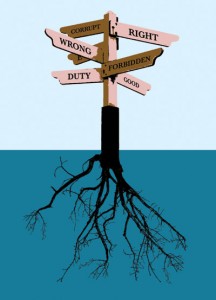 Wake Forest University president Nathan Hatch, marking the Sesquicentennial of Boston College, made a few remarks on the case for religion in liberal education. Among them:
Wake Forest University president Nathan Hatch, marking the Sesquicentennial of Boston College, made a few remarks on the case for religion in liberal education. Among them:
The mystique of digital connection keeps us in a constant state of anticipation and interruption. When a beep goes off, our first obligation is to respond. William Powers has written an interesting book on this subject: Hamlet’s BlackBerry: A Practical Philosophy for Building a Good Life in the Digital Age (2010). There he warns that a digital consciousness is the enemy of depth, keeping us constantly distracted. More than any other sort of college or university, religious institutions know the value and the practice of deliberation, concentration, meditation, and solitude. The question with regard to the coming generation is how to create environments for students that make such experiences possible and attractive in the midst of electronic attachments.
The challenge, it seems, it coming to grips with a new reality. If the medium is the message, then the expectation should be that digital consciousness will eventually give way to simply consciousness. Who we are we will be digitally. Can that be right?
The absolute authority … is the sovereign self. Individuals are autonomous agents who have to deal with one another, but do so as self-directing choosers. The words duty, responsibility, and obligation feel vaguely coercive or puritanical. As one young adult told the researchers, “Morality is how I feel, too.”
How do we get beyond this deep gulf—what Dennis O’Brien (former president of Bucknell University and the University of Rochester) has called “the disappearing moral curriculum”? How do we begin to address the reality behind the stark assessment of the journalist David Brooks that, “on the whole, college students are articulate on every subject save morality”?
My thought would be that creating a curriculum ain’t gonna do it. Morality is one of those things you absorb over time, by way of parents and communities as well as schools. Dismiss the breakdown of societal cohesion at the cost of integrated selves. It’s hard to be your own absolute authority when you have no idea who you are. Identity is not a wholly self-created reality. It demands input from your environments and relationships.
Church and its leadership, we need to show patterns of worship and service that are winsome and life-giving. In a world that preaches that the self is the center of life, we need to show compelling examples that the purpose of life is not to find yourself but to lose yourself: in education, in health reform, in third world development, in building businesses and professions that are genuinely for the common good, and in a myriad of other ways that a creative campus can devise.
This is a beautiful sentiment–and possible. But in America, getting beyond individualism, consumerism, autonomy and personal liberty is a hard sell. Jesus may have been right that to lose your life is to find it. But I need a guarantee that the life I find is the life I want.












